'We are in Africa, but most of us understand China through the Western media. I wanted to go by myself to explore the country on my own, not through a Western perspective," says Hicham Erfiki, a second year PhD student from Morocco at Peking University.
As a member of the PKU African Student Association, Erfiki helps organize many activities, such as conferences, sports and cultural events, to promote African culture in Beijing.
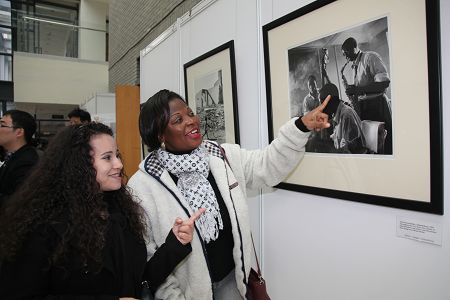
Photo exhibition "South Africa Through the Eyes of Jurgen Schadeberg", part of 2012 PKU International Cultural Festival (PKU News)
"I can see more PKU students are interested in our activities," says Erfiki, 28, who has lived in China for almost seven years.
According to the Ministry of Education, 27,052 African students studied in China in 2012, an increase of 30 percent on the previous year. That's a significant change from 2003, when just 1,793 students from Africa studied in the country.
China has increasingly become one of the most popular overseas study destinations for African students like Erfiki.
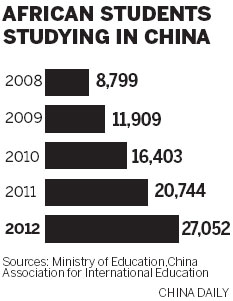
The year-over-year swell of African students in China
Erfiki came to Peking University in 2007 after earning a bachelor's degree from the Universite Mohammed V-Souissi in Morocco.
With increasing Sino-African cooperation, he realizes Africa needs more people who have a deeper understanding of China.
Erfiki says that many educated youth in Africa only know about China through their studies in Europe and the United States, which leads to a misunderstanding about the country.
"I chose something different to be different," he says. "I am lucky to be in a good school in China, better than many European schools," he says.
The Chinese government has made efforts to encourage cooperation with Africa in higher education.
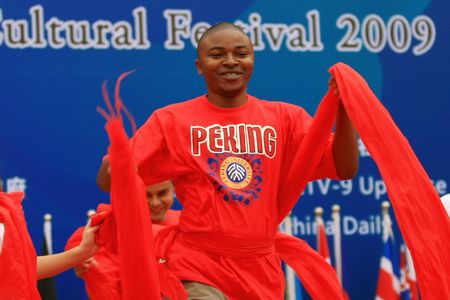
Mundele Beya Wa Beya, DR Congolese and former head of PKU African Student Association (PKU News)
A program called the 20 Plus 20 Project was initiated in 2009 at the Forum on China-Africa Cooperation, and launched in 2010 by the Ministry of Education. The program partnered 20 universities from China with 20 universities from Africa. The Chinese universities provide students and faculty exchange opportunities, government scholarships and Chinese-language training to African students.
Peking University, where Erfiki attended, partnered with the Cairo University in Egypt.
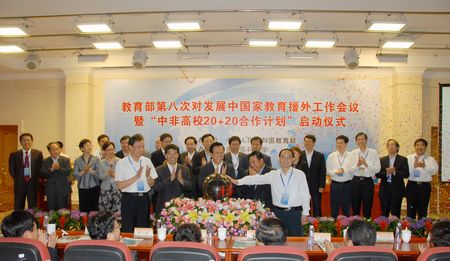
PKU joined in the "20 Plus 20 Project" back in 2010. (PKU News)
In addition to sending students and faculty to Cairo University, the partners are exploring more in-depth cooperation in research, faculty training and curricula sharing.
Wang Suolao, an associate professor and the director of the Center for Middle Eastern Studies in the School of International Studies at Peking University, is in charge of the 20 Plus 20 Project at the school. He says the faculty plans to translate two Chinese classical works into Arabic, and two Arabic masterpieces into Chinese.
Some may think that the cooperation only benefits African universities, but Wang, a Middle Eastern studies scholar, says the cooperation is mutually beneficial.
"Cairo University has strengths in many areas, such as archaeology and Islamic studies and Peking University is famous for humanities and social sciences. The cooperation can benefit both schools," he says, adding that finding the right partner is key to building high-quality cooperation.
Cooperation between the two universities dates back to the 1950s.
The first group of Africans that studied at Peking University was from Egypt. Today, African students at Peking University, major in not only Chinese but also political science, management, journalism and other subjects.
"It is a way to promote China's soft power in Africa," Wang says.
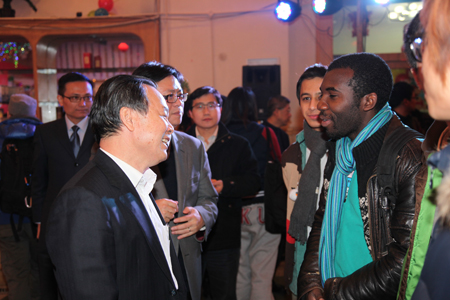
Former President Zhou Qifeng talks with an African student. (PKU News)
In the past, the majority of African and Middle East families only sent their children to Europe and the US. But with the Confucius Institutes and programs such as 20 Plus 20, more African youth understand China better and are starting to learn Chinese, Wang says.
He says there are some obstacles for further cooperation, such as political instability, the traditional belief that Europe and the US are more developed, and a lack of money.
"Plane tickets cost a lot," Wang says.
However, efforts have paid off. Without even knowing how to say hello in Chinese, the young Moroccan came to Beijing to study international politics for his master's degree. Now Erfiki speaks fluent Chinese and is continuing his PhD studies at Peking University.
Reported by: Luo Wangshu
Source: China Daily
Edited by: Arthars